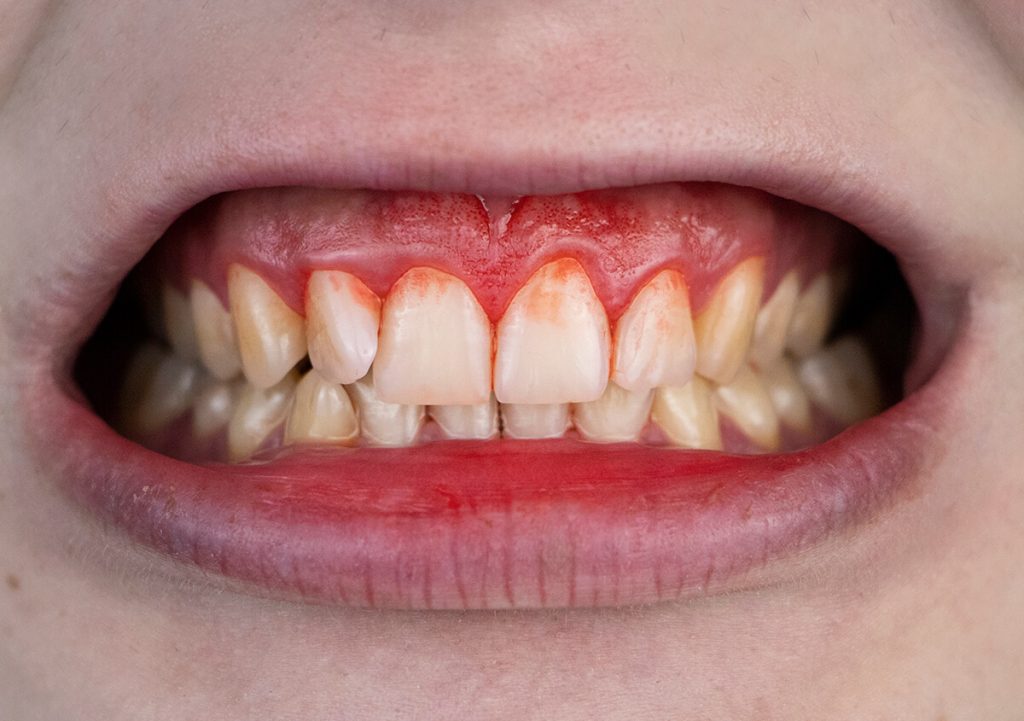[adinserter block=”4″]
When it comes to your oral health, it’s more than just the teeth—a dentist who is concerned about your oral health as a whole will also pay close attention to the gums. For the overall health of your body, it is critical to have healthy teeth free from bone loss, chronic inflammation, and infection in the gums. Loss of bone supporting your teeth, inflammation, and infection in the gums is “painless,” and many patients don’t even know that they are in trouble.
Healthy gums are beneficial as they help protect your teeth and keep harmful bacteria from getting into your bloodstream and negatively affecting your oral health and systemic health. Chronic, long-standing gum disease allows bacteria to get into the bloodstream from inflammation and bleeding gums. The capillaries (the smallest blood vessels in the body) become permeable and create a substantial super Highway that billions of bacteria drive through every day.
This bacteria in the bloodstream now causes numerous systemic pathologies. Just think about billions of bacteria in your bloodstream roaming around, looking for places to infect. This bacteria, a factor in heart disease and strokes, have an increasingly harmful effect on diabetes and has been proven to lodge itself in the brain.
The anaerobic oral bacteria found in the brain is called “P. gingivalis.” Once in the brain, P. gingivalis stimulates the production of plaque and amyloid that try to cover and surround this bacteria. This plaque and amyloid build-up are cumulative and happen over decades in people who do not floss or do excellent home care.
Also, these “patients” don’t go to the dentist regularly to have a professional cleaning by a skilled hygienist. People who don’t take care of their teeth or have gingivitis or actual periodontal disease should have their teeth professionally cleaned every 3-4 months.
It takes about 90 days for the oral bacteria to accumulate enough to start eating away bone from around the teeth. The sad thing is that once you lose any bone around your teeth, it is lost forever. The jaw bone supporting the teeth will never grow back and will continue to be lost if nothing is done to stop the loss.
As we have discussed, the only way to prevent gum disease and bone loss is excellent daily home care which is brushing several times a day AND, more importantly, flossing with regular string floss every day or two at the most. The only floss that goes deep enough and surrounds the necks of the teeth is your regular, long string floss.
The small bag of those Green handled flossers with the 2-inch piece of floss on it are not good to floss with at all. They are only good for getting food out between your teeth. These flossers do not get below the gums deep enough and do not wrap around your teeth as regular floss does. It is crucial to keep in mind that healthy gums do NOT bleed. They don’t bleed when you brush your teeth or when you floss deeply below the gums.
At Briglia Dental Group in West Chester, Pennsylvania, Dr. Ron Briglia and his team are here to help patients achieve and maintain a healthy smile free from periodontal disease. We provide the diagnosis of gum disease, review the necessary treatment that you need, ensuring patients keep their teeth—and gums—free from problems!
What is gum disease?

Gum disease, also known as periodontal disease, is a common oral health problem ranging from mild gingivitis to severe periodontitis. Gum disease occurs when bacteria form plaque on the teeth and gums. The bacteria cause inflammation of the gum tissues, leading to bone loss and tooth decay if left untreated.
What are the symptoms of gum disease?
Symptoms of gum disease can vary depending on its stage and severity. In its early stages, gum disease may not cause any noticeable symptoms. However, as it progresses, patients may experience redness or swelling of the gums, bleeding during brushing or flossing, bad breath, tenderness or pain in the mouth, and receding gums. By visiting a dentist for an evaluation, you should be able to catch this condition in the earliest stage for the most successful treatment.
How is gum disease treated?
The stage at which the condition has reached will determine the treatment method appropriate for the patient. Treatment may include any of the following services:
- Deep cleaning
- Scaling and root planing
- Gum recession repair
- Antibiotics
- Special mouthwashes and toothpaste
- A referral to a periodontal specialist when your case is more advanced, which may require gum surgery.
Do you suspect you are dealing with gum disease?
An evaluation and periodontal examination with the team at the Briglia Dental Group should be your next step! Visit our team in West Chester, PA, to request an examination. We are conveniently located at 600 East Marshall Street, Suite #201, and accept new and returning patients who call for an appointment at (610) 615 0160.
Share this Article
[adinserter block=”4″]
Source link

